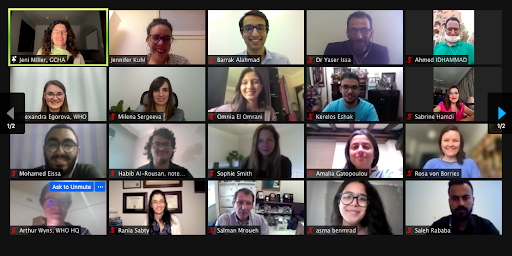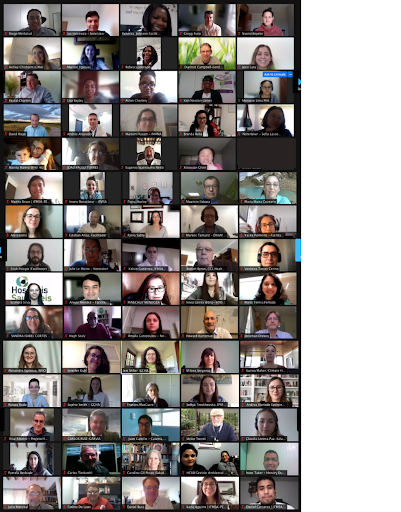The Regional Consultations are a series of online activities in the six WHO regions, which involved health professionals who are working to address causes and impacts of climate change. In this blog, GCHA’s Network and Engagement Lead Jennifer Kuhl highlights the involvement of health professionals in the process, and the outputs of the regional consultations.
by Jennifer Kuhl
In the summer of 2020, the WHO-Civil Society Working Group suggested we build on the unprecedented health community engagement seen during the #HealthyRecovery campaign by convening an online event series supporting health civil society around the world to connect about climate change. With in-person meetings off the table from most of 2021, we knew it was going to be challenging to nurture and grow our crucial relationships with GCHA partners and members. Hosting meetings online seemed like an intriguing solution, and we decided to take the plunge.

Starting in February this year, we worked in partnership with the WHO Climate and Health Team, WHO regional offices, Working Group Members and dozens of advisory organizations to plan and host consultations in each of the six WHO regions. In every region, we were blown away by the commitment, energy and ingenuity of the health professionals who are working to address causes and impacts of climate change.
While each consultation had its own unique character, 3 factors made all of the Regional Consultations an unprecedented and valuable venture:
- Collaborative planning – From the beginning, the Regional Consultations benefited from the collaboration of multiple invested stakeholders. To ensure that the meetings met the needs of each region, we met with health organizations and stakeholders in our network whose questions and suggestions helped create dynamic consultations. Partners also leveraged the strength of their networks to extend invitations to a broad spectrum of health groups, expanding the climate and health community in all regions. Throughout, we worked in close collaboration with the WHO Climate team and with WHO Regional offices. The consultations were truly the product of the WHO and civil society working together.
- Rich digital engagement – The fact that people could join the consultations from their homes and workplaces, without having to pay anything or travel, or take time off, made these events significantly more accessible than an in-person event would have been. As a result the consultations benefitted from a group rich in perspectives, expertise and experience. People joined the meetings from all around the world, and organizations’ representatives volunteered to provide skillful facilitation and record the sessions, helping to involve all participants. Also, thanks to suggestions from participants, we created a crowd sourced playlists for each region.
- Opportunities for shared learning – The consultations offered both structured and fluid opportunities for participants to learn from each other.
The case studies section of the agenda showcased work being implemented to protect health from climate change. Presenters shared inspiring examples of projects that are helping communities to transition to a healthy, climate-resilient and climate-just future. In addition to being shared during the regional consultations, many case studies are included in the WHO’s COP26 Special Report “The Health Argument for Climate Action” and on the WHO Website. Video recordings of many case study presentations are available here.
The consultations also included a number of workshops. The one led by Health Care Without Harm mainly focused on reducing the environmental impact of health care systems, working across the regions, while the International Federation of Medical Students Associations highlighted opportunities for health student action on climate change. The GCHA workshop was used to highlight the value of public declarations on climate action, especially when made by health organizations. Workshop participants brainstormed potential declaration content and inspired the creation of a web-based declaration building tool. We’ll be launching the tool in the New Year and hope it will help organizations pick up where the consultations conversions left off, with a boost to draft their own declaration.

Towards stronger regional connections for the health community
With this year being an especially important one for climate action, the consultations supported the health community to become regionally networked and ready to take action in the months leading up to COP26. They informed WHO’s COP26 Special Report “The Health Argument for Climate Action” and built the network that converged in the #HealthyClimate Prescription letter, which brought together 500+ organizations representing 46 million health professionals.
GCHA is preparing a report on the findings of the consultations that will be released in the new year, and a few elements have already emerged:
- Health workers are on the front lines of the climate crises and are seeing its impacts on the health of their patients and communities
- In many regions of the world, more research is needed – people want to implement evidence based solutions and for that they need evidence.
- Health workers are developing innovations to reduce emissions and solutions to address climate impacts, and there are many opportunities for shared learning across countries and regions
- The health sector cannot address the challenges we are facing alone – we need to collaborate with other sectors and we need ambitious climate commitments and actions from governments.
We hope the consultations will be a first step furthering connections, collaborations and climate action for many years to come. They were made possible by the generous support of the World Health Organization, the Canadian Medical Association, the Children’s Investment Fund Foundation and the RWN Foundation.

